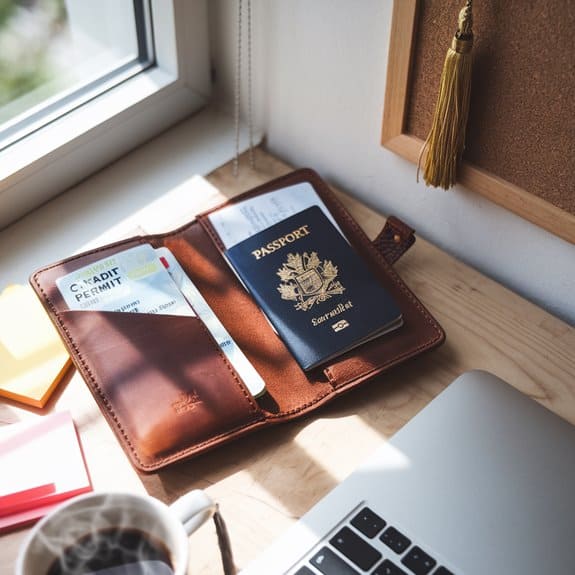
Canada’s Post-Graduate Work Permit (PGWP) allows you to work anywhere in the country for up to three years after graduating from an eligible Canadian institution. You’ll need to complete at least 8 months of full-time study with over 50% in-person instruction and apply within 180 days of program completion. Starting November 2024, you’ll also need specific language proficiency levels based on your program type. This extensive permit system opens multiple pathways to achieving your Canadian immigration goals.
What Is a Post-Graduate Work Permit?
A Post-Graduation Work Permit (PGWP) is an open work permit that allows international students who’ve graduated from Canadian Designated Learning Institutions to work for any employer across Canada.
You won’t need a Labour Market Impact Assessment (LMIA), and you’ll be able to gain valuable Canadian work experience that can help with your permanent residency applications.
Your PGWP can be valid for 8 months to 3 years, depending on your study program’s length, but it won’t exceed your program’s duration.
To qualify, you must complete at least 8 months of full-time study, with more than 50% of your program being in-person instruction.
You’ll need to apply within 180 days of completing your program, and you can submit your application from within Canada or overseas.
Eligibility Requirements for PGWP
To qualify for a Post-Graduation Work Permit, you’ll need to meet several key requirements that demonstrate your academic commitment and eligibility.
Obtaining a Post-Graduation Work Permit requires meeting specific criteria that showcase your dedication to academic excellence in Canada.
You must have completed a program that’s at least 8 months long at a designated learning institution while maintaining full-time student status. Additionally, you’ll need to apply within 180 days of receiving your final marks or program completion confirmation.
- Starting November 1, 2024, you’ll need to prove language proficiency (CLB/NCLC 7 for bachelor’s and higher degrees, CLB/NCLC 5 for college programs)
- Your program must be completed mostly in-person, with online studies limited to less than 50% of total courses
- Your field of study must align with Canada’s labour market needs, including areas like healthcare, STEM, trades, and agriculture
Duration and Key Features
Once you’ve met the eligibility requirements, understanding the duration and features of your Post-Graduation Work Permit will help you plan your career path in Canada. Your PGWP’s validity period depends on the length of your completed program, ranging from 8 months to 3 years.
| Program Duration | PGWP Length |
|---|---|
| Less than 8 months | Not eligible |
| 8-23 months | Same as program |
| 24+ months | 3 years |
| Multiple programs | Combined length |
| Accelerated programs | Actual study time |
You’ll be able to work for any employer in Canada without requiring an LMIA. You can also change jobs, work locations, and even start your own business. The permit is non-renewable, so it’s important to plan your next steps, whether that’s pursuing permanent residency or exploring other work permit options.
Language Proficiency Requirements
Since November 1, 2024, language proficiency requirements have become a crucial component of the Post-Graduation Work Permit application process.
You’ll need to demonstrate your language skills through approved tests like CELPIP, IELTS, or PTE for English, or TEF and TCF for French. Your test results must be less than two years old when you apply.
- For bachelor’s, master’s, or doctoral degrees, you’ll need CLB/NCLC 7 in all four language areas (reading, writing, listening, speaking).
- For other university programs, you’ll need CLB/NCLC 7 plus graduation from an eligible field.
- For college or other programs, you’ll need CLB/NCLC 5 and graduation from an eligible field.
These requirements guarantee you’re prepared for Canada’s workplace environment and can communicate effectively in your chosen profession.
Fields of Study That Qualify
While applying for a Post-Graduation Work Permit after November 1, 2024, you’ll need to guarantee your field of study aligns with Canada’s labour market needs.
If you’re pursuing a bachelor’s, master’s, or doctoral degree, you won’t face specific field restrictions. However, for other university programs and college diplomas, you’ll need to complete studies in designated sectors.
Your program should fall within key industries such as healthcare, STEM (Science, Technology, Engineering, and Mathematics), agriculture and agri-food, trades, transportation, or education.
To verify if your program qualifies, you can check its Classification of Instructional Programs (CIP) code against Immigration, Refugees and Citizenship Canada’s approved list.
These requirements aim to address Canada’s labour shortages while providing valuable opportunities for international graduates.
Application Process and Timeline
To begin your Post-Graduation Work Permit application process, you’ll need to gather essential documents and submit them within 180 days of receiving your final marks.
The processing time typically ranges from 80 to 180 days, and you can work while waiting if you’ve applied before your study permit expires. You’ll need to include your official transcript, completion letter, and valid language test results.
- Submit your application online through the IRCC portal, ensuring all documents are clear, complete, and in the correct format.
- Track your application status using your account number, which you’ll receive after submission.
- Monitor your email regularly for any requests for additional documentation from IRCC, as delays in responding can affect processing time.
Working While Awaiting PGWP Approval
Many international graduates can legally work in Canada during the PGWP processing period, but specific conditions apply.
You’re eligible to work if you’ve submitted your PGWP application before your study permit expires and you’ve met all program completion requirements.
Working in Canada is possible after graduation, provided you apply for PGWP while your study permit remains valid.
If you’re working while awaiting approval, you must stop working immediately if your PGWP application is refused.
You’ll also need to guarantee you maintain valid status in Canada throughout this period.
If your study permit expires before you receive your PGWP decision, you can continue working as long as you apply before the expiration date.
However, if you didn’t apply for your PGWP before your study permit expired, you’ll need to wait until you receive your work permit before you can start working.
Important Changes Coming November 2024
Starting November 1, 2024, Canada’s Post-Graduation Work Permit program will introduce significant changes affecting international students.
You’ll need to meet new language requirements and field of study criteria to qualify for a PGWP. The changes vary based on your program type and when you applied for your study permit.
- For bachelor’s, master’s, and doctoral degrees, you’ll need CLB/NCLC 7 in all language skills (reading, writing, listening, speaking).
- For other university programs, you’ll need CLB/NCLC 7 and graduation from an eligible field linked to Canada’s labour market needs.
- For college programs, you’ll need CLB/NCLC 5 and completion of a program in sectors like healthcare, STEM, trades, or agriculture.
These requirements guarantee graduates are better prepared for Canada’s workforce and address specific labour shortages.
Pathway to Permanent Residency
Once you’ve obtained your Post-Graduation Work Permit, you’ll have access to several pathways that can lead to permanent residency in Canada.
The Canadian Experience Class, part of the Express Entry system, requires at least one year of skilled work experience, making your PGWP an invaluable stepping stone.
You can also explore the Federal Skilled Worker Program, where your Canadian education and work experience will greatly enhance your Extensive Ranking System (CRS) score.
Additionally, Provincial Nominee Programs often prioritize candidates with Canadian credentials and work experience, offering specialized streams for international graduates.
Your PGWP period gives you time to gain the necessary work experience while building connections and adapting to Canadian workplace culture, strengthening your permanent residency application regardless of which pathway you choose.
Common Reasons for PGWP Rejection
Despite careful preparation, Post-Graduation Work Permit applications can be rejected for several key reasons that applicants should watch out for. Understanding these common pitfalls can help you avoid delays and denials in your application process.
Your submission might face rejection if you don’t meet core eligibility criteria or make mistakes in your documentation.
- You’ve submitted an incomplete application package, missing critical documents like your transcript or completion letter.
- You’ve waited too long to apply – exceeding the 180-day deadline after program completion.
- Your program doesn’t qualify for PGWP eligibility, such as short-term certificates or primarily online courses.
These issues can greatly impact your chances of approval, but they’re often preventable with proper planning and attention to detail.
How Canadian Currents Immigration Can Help
When maneuvering the complexities of post-graduation work permits, Canadian Currents Immigration‘s team of experienced professionals can provide you with thorough support and guidance.
Our team includes immigration lawyers, consultants, and paralegals with decades of combined experience in immigration law. We’ll work closely with you to assess your PGWP eligibility, review your documentation, and guarantee your application meets all current requirements.
You’ll receive personalized assistance tailored to your specific situation, whether you’re dealing with language requirements, program eligibility concerns, or timing considerations.
We’ll help you navigate the new requirements coming into effect in November 2024 and develop a strategy that maximizes your chances of approval, all while keeping the process efficient and cost-effective.
Frequently Asked Questions
Can I Travel Internationally While My PGWP Application Is Being Processed?
You can travel internationally while your PGWP processes, but it’s recommended to stay in Canada. If you must travel, make certain you have proper documentation to re-enter the country.
What Happens if I Lose My Job During My PGWP Period?
If you lose your job while on a PGWP, you can seek new employment since it’s an open work permit. You’re free to work for any employer anywhere in Canada.
Can I Start My Own Business While on a PGWP?
Yes, you can start your own business while on a PGWP. Since it’s an open work permit, you’re free to be self-employed, work for others, or run your own business in Canada.
Are PGWP Holders Eligible for Employment Insurance Benefits?
Yes, you’re eligible for Employment Insurance (EI) benefits if you’re a PGWP holder who has worked enough insurable hours and meets other EI requirements. You must continue having legal status to receive benefits.
Can My Spouse Work in Canada While I’m on a PGWP?
Yes, your spouse can apply for an open work permit while you’re on a PGWP. They’ll be able to work for any employer in Canada during the validity of your permit.
Conclusion
Your PGWP journey is an essential step toward building a career in Canada. By understanding the eligibility requirements, language proficiency standards, and upcoming changes in 2024, you’ll be better prepared for success. Remember to time your application carefully, maintain your study status, and meet all criteria. This permit isn’t just about temporary work – it’s your potential pathway to permanent residency in Canada.

We serve ALL of Canada. Currently have offices Western Canada — Vancouver, Calgary, Edmonton, Kamloops and Red Deer. We also have the infrastructure to work with any of our clients virtually — even from the furthest regions of the Yukon to Newfoundland.
Call (778) 331-1164 [toll free 1 (844) 715-0940] to get routed to the best office for you or contact us online to schedule an appointment.
We also have a dedicated intake form to help you get the ball rolling. Our intake team will review your specific case and advise you on the next steps to take as well as what to expect moving forward.
Our offices are generally open 8:30 a.m.—4:30 p.m., Mon—Fri.

Alfonso Chen
IMMIGRATION LAWYER
Alfonso is a lawyer of our Vancouver office who provides services in both English and Mandarin. Prior to joining our firm, he worked at a full-service law firm for over four years, where he helped clients with a wide variety of family law matters, from drafting prenuptial agreements to negotiating terms for and drafting separation agreements to representing clients for divorces.



